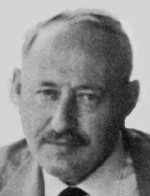Sinological Profiles
Étienne Balázs
1905 (Budapest) - Nov 1963Many whose lives overlapped the time of Hitler lived their lives on the run, Balázs more than most. But he also survived to be more productive than most, when time was again propitious.
Balázs Istvan, to give him his Hungarian name, began by studying philosophy in his native Budapest. This presently led him to an interest in Dauism and Buddhism. He went to Berlin to work on Chinese under Otto Franke. Instructed also by reading Weber and Marx, he eventually did his thesis in an entirely different area: the economic history of Tang. This was almost virgin territory, which had been neglected by Chinese as well as Western scholars. Balázs handled it so well that Franke called it the best thesis ever done under his direction. Balázs then briefly returned to the Six Dynasties, where his original interest in Dauism and Buddhism found congenial scope. Politically, he also worked against the rising Hitler movement.
The Hitler movement, however, continued to rise. Like many Six Dynasties persons, confronted with unmanageable opposition, Balázs fled across a boundary. In the late 1930's, he took up residence in Paris.
Thither the Nazis followed him. When Paris fell in 1940, Balázs fled again, to the village of Meauzac, near the Pyrenees in the south of France, where he and his wife lived in concealment. Balázs grew vegetables on a small plot of land and kept geese; his wife did needlework. They survived undetected, or more precisely, unbetrayed. Konrad Bieber said of this period, in a letter to Arthur Wright:
"In Meauzac, where there were five refugee families, the whole village took pride in sheltering and protecting those refugees, and often literally stood watch for them. The gendarmes usually closed their eyes . . . but some were known for their zeal, and one could never predict. The psychological pressure and uncertainty were great."
Amid the constant tension and insecurity, Balázs managed to find some moments, and some equanimity, for research. His first published piece after the war was in keeping with the war experience: a study of mystical escapism in "the frenzied struggle for power at the end of the Han dynasty."
Liberation did not bring instant success. For four years, Balázs taught in high schools, waiting for a break, but working while waiting. In 1949, he had envisioned a systematic study of the Sung dynasty, but without being able to pursue it at that time. In 1950 he became Director of Research at the Centre National de la Recherche Scientifique, and explored the dynastic histories' monographs on economic matters (1953-1954). For the second of those volumes, on the economic treatise of the Swei Shu, he received the Julien Prize in 1954. This brought him to the attention of Fernand Braudel, working in the tradition of the French Annales school that had been founded by Marc Bloch. The resulting contact widened the scope of the Annales school's awareness of what history is about, and what the study of history seeks to explain. Also in 1954, with funding from Italy, since the idea was not contemporary enough for Rockefeller, Balázs launched the collaborative Sung Project, putting into motion his 1949 idea. The Project brought together young scholars from Europe, America, and Japan, in a systematic and cooperative attempt to survey the ground and develop the tools for this, the first period when Chinese economic history has sufficient detail for an economist to really bite on.
Balázs thought that classical studies were a waste of time, and wanted them out of the way. He saw it this way:
My point is that, in spite of all the changes that have taken place in the world, the bureaucratic society of an empire that lasted for two thousand years is still with us as an extremely active force.
That is, the Sung Dynasty is justified because in a sense it is contemporary. But (one might object) the justification of history because it is connected with the contemporary world works even better for the contemporary world itself. Is there any reason to think that we understand current Chinese government economic policy better because we know about Wang An-shr? It can be denied, and Rockefeller indeed denied it. If it is admitted, is there any reason to think we understand Wang An-shr and the ridiculously rigid ideological system against which he worked, without knowing what process put that ridiculously rigid system into place? The forces that shaped it and the materials out of which it was shaped, and the options of development that were neglected to shape it just that way? The answer to that question continues be elusive.
References
- Arthur F Wright (ed). Etienne Balázs: Chinese Civilization and Bureaucracy. Yale 1964. Contains a biographical Introduction by Arthur Wright
- Yves Hervouet (ed). A Sung Bibliography. Hong Kong 1978. The final version of a work begun by Balázs. The Introduction by Hervouet gives a brief history of the Sung Project. The annotated Bibliography itself contains 660 items; about one-fifth of the entries are in French.
- Harriet Zurndorfer. Not Bound to China: Etienne Balázs, Fernand Braudel, and the Politics of the Study of Chinese History. Past and Present #185 (Nov 2004) 189-221
Fritz Mote contributed to this profile.
1 July 2004 / Contact The Project / Exit to Sinology Page

